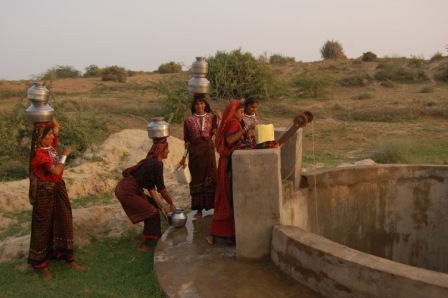
Project Summary
Kutch, the largest district in the country, is affected by cyclical droughts. Sahjeevan, which has worked in this area for over two decades, introduced a community-centric, decentralised drinking water model to help the villages in Kutch achieve water security. Called ‘Pani Thiye Panjo’ meaning “Let’s make this water ours again”, the project assisted over 100 villages to develop their own water sources and no longer depend on outside sources for water supply. This was developed as a multi-stakeholder programme with three funding agencies – WASMO (Water and Sanitation Management Organisation-the state government’s agency to assist in providing rural water and sanitation, Arghyam and Suzlon Foundation. The implementation of the programme was carried out by Sahjeevan, and 3 partner NGOs. Some of the main outcomes include:
- Ground Water protection guidelines prepared and implemented in 5 villages. This helped Pani Samitis manage the shared aquifer judiciously
- Conjunctive use of water resources was ensured. Multiple water sources such as groundwater based piped water supply, hand pumps, rainwater harvesting and dug wells were used to provide water.
- Successful advocacy with government agencies. WASMO & GWSSB acknowledged the need for dual sources of water supply (from centralised distribution and management systems and traditional water sources), geo-hydrological based planning and implementation of drinking water projects and development of a cadre of people who could become barefoot hydro-geologists.
Now, around 60 villages have access to drinking water and hence are no longer face water scarcity.
Outputs
- Community radio was used effectively to increase awareness in Abdasa and adjoining taluks. Over 10 episodes were aired.
- The project demonstrated a safe & sustainable model of a decentralized drinking water source, through introduction of the Pani Thiye Panjo project.
- The project leveraged over Rs. 470 lakh from community contributions, government schemes and other sources.
- Around 40,000 people gained access to water through decentralized drinking water sources.
- Improved access to good quality, adequate water through construction / restoration of over 50 wells.
- Wells were constructed in around 80 villages.
- Water storage capacity increased in over 20 ponds and in 10 villages. The project also ensured supply of water to livestock and segregation of water sources for human and animal use.







 Sahjeevan
Sahjeevan